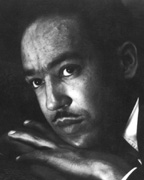

James Langston Hughes (1902-1967) was born in Joplin, Missouri. Hughes's
parents had divorced when he was young. His father moved to Mexico and
his mother moved to Lincoln, Illinois with her recent husband, leaving
Hughes to be raised by his grandmother until he was twelve, when he went
to live with his mother in Illinois, eventually settling in Cleveland,
Ohio. Upon graduation from high school (where he began to write poetry),
he went to live with his father for a year in Mexico, later traveling to
New York to attend Columbia University.
Before pursing his career as a poet and writer, he
held odd jobs as an assistant cook, launderer, and a busboy, and traveled
Africa and Europe working as a seaman. In 1924, Hughes moved to Harlem,
New York where he wrote his first book of poetry, The
Weary Blues.
d Langston
Hughes is not only known for his short stories, plays, and poetry, but
also for his colorful portrayals of black life in America around the 60's.
He was primarily influenced other profound writers such as Paul
Lawrence Dunbar , Carl
Sandburg , and Walt
Whitman . Hughes's work largely contributed to the artistic expression
during the Harlem Renaissance in the 20's. He refused to differentiate
between his personal experience and the common experience of blacks in
America. His goal was to tell stories of his people (blacks) without personalizing
them so he could draw his own conclusions.
Hughes died of heart failure in 1967 at his resident
in Harlem, New York.
Here
are some of Langston Hughes's more well known poetry works:
Dream
Variations
Life
is Fine
Madam
and the Phone Bill
Madam
and Her Madam
Po'
Boy Blues
The
Negro Speaks of Rivers
Night
Funeral in Harlem
Dream
Deferred
Dinner
Guest: Me
Cross
Cultural
Exchange
Children's
Rhymes
Theme
for English B
For
more information on Langston Hughes, visit the Academy of American Poets
at
http://www.poets.org/poets/poets.cfm?prmID=84
Back to I, Too, Sing America